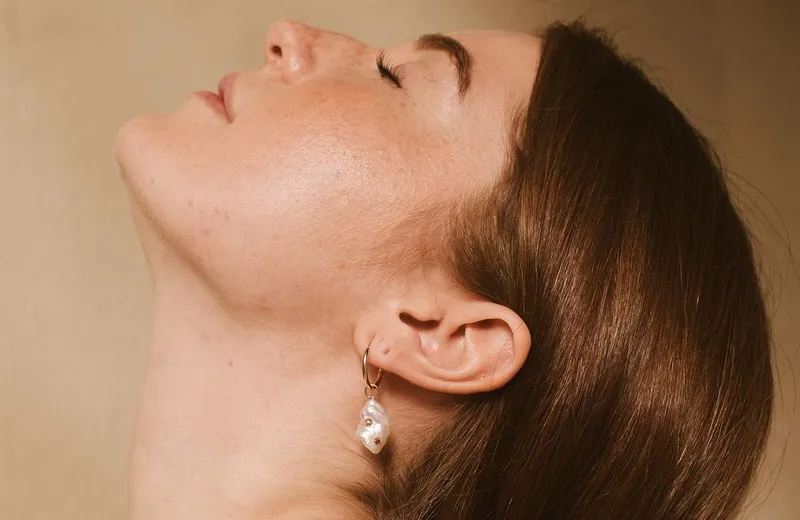If you’re on a quest to obtain a flawless, luminous complexion, you may pause over any spot that appears in your reflection and try to determine its root cause. Is it a dark spot? An acne scar? Are they one and the same?
While dark spots can mimic acne scars and acne scars may cause discoloration, technically, there are marked differences between the two—primarily in terms of why they occur, how they manifest, and how they’re treated. The more knowledge you have on the topic, the better equipped you’ll be to find what you need to soften their appearance and prevent them from occurring in the future.
Let’s take a magnifying glass to each and unpack the dark spots vs acne scars question together.

Custom Luxury Skincare At An Affordable Price
Lighten up those dark spots with a personalized, 3-step routine packed with powerful brightening ingredients.
What Are Dark Spots?
“Dark spots” is an umbrella term for any sort of hyperpigmentation on your skin, whether it surfaces on your cheekbones, your hands, your shoulders, or your collarbone. Also called sun spots, age spots, liver spots, freckles, and what is THAT?, dark spots can be caused by overexposure to UV radiation—a.k.a., the sun’s damaging rays [1].
More specifically, dark spots refer to the overproduction of melanin, the naturally-occurring pigment that gives your skin, hair, and eyes their color [2]. Ranging in shades from light brown to dark brown, and varying in size and location, dark spots can compromise your efforts to achieve a radiant, balanced complexion.
What Causes Dark Spots?
In addition, the most common culprits of dark spots boil down to [5]:
- Hormonal changes – Shifts in our hormones, as well as shifts due to hormonal birth control, can incite a spate of body-wide responses—and your skin is a frequent target. In particular, dark spots known as chloasma may appear during pregnancy.
- Irritation – Whether you used a skincare product that doesn’t agree with you or a chemical-laden detergent on your pillowcases, irritation of nearly any kind may activate melanin production.
- Genetics – Are freckles a given in your family? If so, you may be more vulnerable to dark spots, too, as research shows they may be hereditary [6].
- Medications – NSAIDs (like aspirin), psychotropic medications, and tetracyclines can provoke pigmentation and cause dark spots.
- Inflammation – Inflammation is a necessary, even desirable response to injury, but if it persists and amps up to chronic inflammation, your skin may feel (and reveal) it. Skin conditions such as psoriasis and eczema, skin injuries like scrapes and cuts, and even acne can cause dark spots, or what’s also known as post-inflammatory hyperpigmentation (PIH) [7].
In some cases, diabetes may also cause dark spots, such as necrobiosis lipoidica and acanthosis nigricans [8]. However, these darkened patches of skin tend to be larger than the dark spots we’re referring to here. We recommend speaking with a board-certified dermatologist to help identify the cause of your dark spots before starting your skincare journey to take care of them.
What Are Acne Scars?
Acne is exasperating enough on its own, but the country’s most prevalent skin condition can also leave behind evidence of its existence in the form of scarring, especially if you pick and pop at your pimples—a topic we’ll jump into in a second [9]. There are also two types of scarring: acne marks vs acne scars, which can also give you more insight to what you may be seeing.
Generally, acne marks and scars appear in one of the following ways [10]:
- Atrophic acne scars – Atrophic acne scars are also known as “depressed” acne scars because they cause the skin to cave inward. Often caused by insufficient collagen production during the wound healing process, atrophic scars can take on several different shapes, such as boxcars (or U-shaped scars with defined edges) and “ice pick” acne scars, which are narrow and shaped like the letter V.
- Hypertrophic acne scars – Hypertrophic, or keloid, acne scars refer to those that are raised—meaning, you can feel the lifted bit of skin they cause if you run your fingers over them [11]. Hypertrophic scars generally appear on your chest and back, but they can also emerge on your face. Unlike atrophic scars, they develop when a glut of collagen is produced as your skin is healing.
What Causes Acne Scars?
Acne scars develop when you have an acne breakout that goes beyond the top layer of your skin and causes harm to the healthy tissue underneath. This is more liable to occur if you irritate acne in any way, such as doing the following to your pimples:
- Picking
- Popping
- Squeezing
We know: It can be challenging to keep your hands off your face when you’re experiencing a breakout. But rest assured that pimples are temporary—and they may heal faster and without acne marks if you leave them alone.

Custom Luxury Skincare At An Affordable Price
Say goodbye to dark spots and hello to radiant skin with your personalized skincare regimen.
Dark Spots Vs Acne Scars: How To Differentiate
The easiest way to differentiate dark spots from acne scarring and marks is to think of how these blemishes impact the surface of your skin [12]:
- Acne scars affect the skin’s texture, meaning they can be raised or indented.
- Dark spots are flat and tend to “sit” on the surface of your skin.
That said, when your skin is healing from acne, it may send melanin to the site of the injury—and a touch too much at that. This can result in a temporarily darkened area.
Whether you have dark spots, acne scars, or both, there are, fortunately, a number of ways to minimize their appearances and dodge them altogether.
How to Treat Dark Spots
Dark spots may appear woefully stubborn, but there are a number of effective ways to diminish their appearance (and even help them vanish altogether). Regardless of how you handle them, experts agree that the earlier you begin treating dark spots, the higher your chances of watching them fade:
- Reach for retinol – Retinol has become one of the leading products recommended by dermatologists for a reason. Not only does it encourage collagen production and mitigate the severity of fine lines and wrinkles, but it may also dull the darkness of troublesome spots. Derived from Vitamin A, this skincare superstar is downright potent—so much so, that you may want to start off only using a tiny amount twice a week to stave off irritation, and follow up your application with an ample dose of daily moisturizer [13].
- Invest in Vitamin C – There are a few other types of vitamins for dark spots, including Vitamin C. Part of Vitamin C’s power rests in its skin-brightening capabilities, meaning it may act as a depigmenting agent [14].
- Rely on niacinamide – According to a 2018 study published in the Journal of Clinical and Aesthetic Dermatology, niacinamide—a form of Vitamin B3—may have the potential to lighten dark spots [15]. The same holds true for other natural ingredients, like licorice and mulberry.
- Add exfoliation to your skincare routine – If you’re on a mission to diminish dark spots, consider exfoliation your new best friend. Exfoliating helps slough off the top layer of your epidermis to uncover the fresh, new skin underneath. It also prompts faster skin cell turnover. As a bonus, ingredients such as glycolic acid act as a natural exfoliator (and may help you defy the signs of aging) [16].
PROVEN’s state-of-the-art technology creates a personalized 3-step skincare set based on your current skin health. Each formula is tailored to gradually add active ingredients like Granactive Retinol and various vitamins to target your specific skin concerns. We wait for your skin to acclimate to the new ingredients before increasing the content to earn maximum results for glowing skin.
But topical ingredients like these are not your only options. For those dark spots that absolutely refuse to budge, you might try:
- Laser treatments
- Microdermabrasion
- Chemical peels
- Prescription lightening creams, such as hydroquinone
How To Treat Acne Scars
Acne scars can be a frustrating reminder of our angst-ridden adolescences—or even a particularly stressful week when we’re in our 40s! Fortunately, no matter when your acne scars formed, they can be diminished with a combination of specific ingredients and treatments [17]:
- Salicylic acid – Salicylic acid is commonly used to combat acne and, as such, it’s featured in myriad products, including cleansers and spot treatments. Deemed as one of the best solutions for acne scars, it helps curb swelling and redness and clears your pores of the dirt, oil, and debris that can inflame your skin and spark a breakout.
- Retinoids – Retinoids are similar to retinol—indeed, the former produces the latter—but they’re much more potent and have a higher concentration of retinoid acids. This means they can be a windfall for acne scars by helping to smooth your skin and revive its texture, while also accelerating cell regeneration and fading discoloration.
Depending on the severity of your acne scars, your dermatologist may also recommend in-person treatments, such as:
- Chemical peels
- Laser resurfacing
- Microneedling
- Hydrafacials
All of the above treatments can help with dark marks or acne scars. But, the best way to minimize them is to ward them off in the first place.
How to Prevent Dark Spots
Unlike some skin conditions that may be inevitable, dark spots don’t have to be part of your future:
- Get serious about sun protection – You’ve likely heard that you need to apply a broad-spectrum SPF every day, and we’re reminding you of that here because it’s that imperative. Protecting your skin from UV radiation isn’t just one of the golden tickets to maintaining your skin’s glow and buoyancy—it’s also the easiest and most valuable way to shield yourself from skin cancer, which is the most common form of cancer in the world, affecting approximately 9,500 people per day [18]. To kill two birds with one stone, we recommend using a daily moisturizer with SPF.
- Don a hat – Continue to enjoy stunning skin and some of life’s greatest pleasures, like golfing, beach volleyball, and summer hikes, by wearing a hat when you’re outdoors.
How to Prevent Acne Scars
It can be oh-so-tempting to pick at or pop a pimple, especially if it looks huge and you have an impending date, job interview, or vacation.
But, as mentioned, these actions can exacerbate inflammation and worsen acne while also upping your chances of over-manufacturing melanin. To avert acne and scar tissue:
- Treat acne as soon as it appears without picking or popping. Instead, use a spot treatment or seek counsel from your trusted dermatologist.
- Avoid skincare products that contain harsh ingredients.
- Refrain from scrubbing your face, which may cause additional irritation.
Achieve Smooth, Balanced Skin With PROVEN Skincare
Dark spots and acne scars may be common occurrences, but you don’t have to succumb to either. Preventative measures, coupled with swift treatments and products that contain effective ingredients, can stop them in their tracks and alleviate their appearance—and PROVEN Skincare can assist with this process.
At PROVEN, we know your skin is as unique as the rest of you. That’s why we’ll design a personalized skincare regimen based entirely on your concerns, unique needs, and aspirations. From eye creams to facial cleansers, our products offer everything you need to look and feel your best.
Balance your complexion, brighten your skin, and more with super-tailored, skin-beautifying products from PROVEN.







